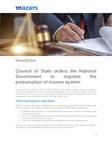
Council of State orders the National Government to regulate the presumption of income system
What is the presumption of income system?
Article 33 of Law 1438 of 2011 establishes who in Colombia are presumed to have the capacity to pay and, therefore, are obliged to affiliate to the Contributory Health Regime, being these:
Individuals declaring income tax and complementary taxes, sales tax and industry and commerce tax.
Those who have income and withholding certificates that reflect the income established to belong to the Contributory Regime.
Those who comply with other indicators established by the National Government.
Likewise, the article in question provided that "the National Government shall regulate a system of presumption of income based on the information on economic activities".
Summary of the decision of the Council of State
The plaintiff by means of a Compliance Action sued the President of the Republic, the Ministry of Health and Social Protection, the Administrative Unit of Pension and Parafiscal Management -hereinafter UGPP- and the National Superintendence of Health in order for them to comply with Article 33 of Law 1438 of 2011 considering that, although to date the UGPP had regulated the cost presumption scheme through Resolutions 1400 of 2019[1] and 209 of 2020[2], none of the aforementioned entities had done the same with the income presumption system.
In this regard, the Ministry of Health and Social Protection, when answering the action, stated that the income presumption system was replaced by the cost presumption scheme, since it allowed determining the Contribution Base Income (IBC) on which self-employed workers must make contributions to the Comprehensive Social Security System.
In the first instance, the Subsection "B" of the First Section of the Administrative Court of Cundinamarca, in a decision dated March 2, 2022, denied the plaintiff's claims, considering that the plaintiff was seeking the preferential application of Article 33 of Law 1438 of 2011 over the special and subsequent regulations, i.e. Article 244 of Law 1955 of 2019 that regulated the IBC for self-employed workers, which no longer provided for the presumption of income system. Dissatisfied with the decision, the plaintiff challenged it.
In resolving the challenge, the Council of State clarified that Article 33 of Law 1438 of 2011, although related to Article 244 of Law 1955 of 2019, does not refer to the same issues. Indeed, while the former seeks with the presumption of income to reduce the levels of evasion, avoidance and delinquency in the payment of contributions that the entire population with the capacity to pay must make, thus guaranteeing the principle of universality of the system[3], the latter is responsible for regulating the determination of the IBC for self-employed workers.
Thus, it stated that the obligation set forth in Article 33 of Law 1438 of 2011 cannot be understood as fulfilled with the regulation of the presumption of costs scheme, and therefore, since the entities had not demonstrated the issuance of the presumption of income system, compliance with it was enforceable.
What is the importance of this decision?
As mentioned by the Council of State in its decision, the issuance of the presumption of income system will make it possible to determine who are the people who have the ability to pay to belong to the Contributory Health System, thus helping to finance the system and preventing those who do not meet the requirements to belong to the Subsidized System (SISBEN) from benefiting from the Subsidized System (SISBEN).
It is worth mentioning that according to the provisions of paragraph 2 of Article 204 of Law 100 of 1993, the income presumption system issued by the National Government for the calculation of the IBC of self-employed workers must take into account: the level of education, work experience, economic activities, region of operation and assets of the individuals.
What other relevant aspects are mentioned in the ruling?
Both the Court and the Council of State referred to the rules that currently govern the calculation of the IBC for self-employed workers, recalling that Article 244 of Law 1955 of 2019 was declared unenforceable by the Constitutional Court in judgment C-068 of 2020, but the effects of such declaration were deferred until the expiration of the following two ordinary legislatures, i.e. until June 20, 2022, in accordance with the legislative calendar of the 2018 - 2022 quadrennium.
With the unenforceability of such rule, Resolutions 1400 of 2019 and 209 of 2020, by means of which the presumption of costs scheme was regulated, would also be without effect, since the provisions that supported them would disappear from the legal system, thus producing the phenomenon known as "decay of the administrative act".
It remains then to wait for the National Government, in response to the Compliance Action, to issue the regulations concerning the presumption of income system, under penalty of incurring in contempt, and, for its part, the Congress of the Republic in the exercise of its legislative function to issue the regulations concerning the determination of the Base Contribution Income for independent workers, since to date the only thing that exists is a bill that has been filed.
Want to know more?


